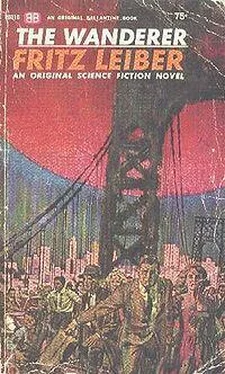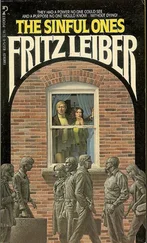Hunter was about to give him a hot answer when Ida said: “You can have my place in the cab. You men don’t know how to care for Mr. Hanks, and it’s my job anyway.”
Hixon tossed down the end of the towline. “Hitch it on your front end,” he directed Hunter. “Think you can?”
“I’ll do it,” said Wojtowicz, grabbing hold of it first.
“I imagine the Corvette’s getting low on gas,” the Little Man said to Hunter.
“It is, Mr. Dodd,” Ann called from beside her mother. “I was watching the needle and it said empty.”
“I’ll get one of the reserve cans,” the Little Man said.
Hunter nodded. He felt simultaneously furious and impotent. Everyone was taking charge for him. Doc would have found something humorous to say at this point, but he wasn’t Doc. He looked at Margo, who was looking at the distant sea, and he felt a sullen hunger.
Sally Harris and Jake Lesher, blanket-wrapped, hooked their elbows for extra safety over the low ridge of the penthouse roof. Two feet below the eaves, the wavelets glittered richly with the beams from the Wanderer’s needle-eye face, which Jake alternately called the Clutching Hand — for the coiled Serpent — and Pie in the Sky — for the Broken Egg.
“And we thought we could make a play of this,” Sally said softly.
“Yeah,” Jake echoed. “We thought we could — a supercolossal spectacle. But we were still thinking indoors.”
Sally looked around at the black waters over Manhattan and at the few low, lonesome towers poking up from it here and there.
“Imagine, some of them still got lights,” she commented.
“Gas engines in their attics,” Jake explained. “Or maybe batteries.”
“What’s that one way down there?” Sally wondered. The Singer Building or Irving Trust?”
“What’s the difference?”
“But I want to be able to remember exactly…or anyway, know exactly, if I’m not going to be able to remember.”
“Forget it, Sal. Look, I brought a flask of Napoleon. How about a snort?”
“You’re sweet,” she said, touching his cold hand lightly with her own, no warmer. And then she sang very softly, as if not to disturb the mounting wavelets:
Oh, I am the Girl on Noah’s Raft And you are my Castaway King. Our love is not as big as a wink Or one single hair from a silver mink — But you stayed with me and you found me a drink; Our love is a very big thing.
Richard Hillary and Vera Carlisle lay a distance apart on green hay taken from a small stack they’d found high in the Malvern Hills. Richard thought restlessly, Last night straw, tonight hay. Straw, seedless and dry, for death. Hay, sour and sweet, for life.
The Wanderer glared down on them from the west, again in its bloated-X face. The planet was becoming as dreadfully familiar as the face of a clock. Some three quarters of an hour ago, Vera had said: “Look, it’s half past D.”
It wasn’t chilly. There was an almost warmish breeze from the southwest — eerie, unnatural, agitating.
One might well think that watching the bore of the Severn rush up its valley, like some white thunder-wall released by the tearing of an eighth seal in the Book of Revelation, would utterly outweary the senses. But, as Richard was now discovering, the senses do not work that way. Experiencing the almost unimaginable only makes them more acid-bittenly alive.
Or perhaps it was simply that they were both too tired, too aching with fatigue poisons, to sleep.
Vera had earlier told him her story. A London business-machine typist, she had been rescued from the roof of an office building during the second high, and had come all the way to the valley of the Severn in a small motorboat, which had navigated the standing highs as Richard had tramped and cadged rides across the muddy lows, only to be wrecked in the edge of the bore near Deerhurst, she alone of the boat’s company surviving, as far as she knew.
A little while ago Richard had asked her to tell her story in more detail, but she had protested that she was much too tired. She had listened to the static on her transistor wireless for a while, and Richard had said: “Throw that away.” She hadn’t, but she’d turned it off. Now she was saying softly: “Oh, I shall never sleep, never. My mind’s revving and revving…”
Richard rolled over and put his arm lightly around her waist, his face above hers, then hesitated.
“Go on,” she said, looking up at him with an oddly bitter smile. “Or do you have sleeping pills?”
Richard thought for a moment, then said rather formally: “Even if I did have them, I should much prefer you.”
She giggled. “You’re so stiff,” she said.
He pulled her to him and kissed her. Her body was tense and unyielding.
“Vera,” he said. Then hugging her determinedly, “For a pet name I shall call you Veronal.”
She giggled again, more at him than appreciatively, he thought, but her body relaxed. Suddenly her fingers clutched at his back. “Go on, try me,” she whispered throatily in his ear. “I’m strong, strong sleeping medicine.”
Barbara Katz had first been depressed by the lowness and narrowness of the one little cabin of the “Albatross,” but now she was glad of those dimensions because it meant there was always a surface close at hand to brace herself against when the boat rocked or pitched farther than she’d been expecting it to. And the slightly-arched roof being so low somehow made it seem more secure whenever a solid wave-top banged down on it deafeningly.
The cabin was pitch dark except when lightning blazed in whitely through the four tiny portholes, or when Barbara used her flashlight.
Old KKK lay blanket-tied to one of the little bunks with Hester sitting braced at his head and holding the unknown baby. Helen stretched out in the other bunk, moaning and retching with seasickness, while Barbara was scrunched in at the foot of that bunk like Hester across from her. Every once in a while Barbara felt through a trap in the planking of the floor for water. So far she hadn’t felt any to amount to much.
The “Albatross” had almost foundered before the west-rushing tide lifted it out of the grip of the mangroves. Then it had almost been keeled over by a taller tree. After that it had been rather fun, until the storm waves had got so high and wild that everyone except Benjy had been forced below.
After a long silence — that is, a long space of listening to nothing but the baby crying and the timbers straining and the waves and the wind hitting the boat — Barbara asked: “How’s Mister K, Hester?”
“He die a little while back, Miss Barbara,” the other replied. “Hush now, baby, you had your canned milk.”
Barbara digested the information. After a while she said: “Hester, maybe we should wrap him in something and put him up front — there’s just enough room — and you should lie down in that bunk.”
“No, Miss Barbara,” Hester replied positively. “We don’t want to chance his hip get bust again or anything. He in good shape now, except he dead, and if he lie soft he stay that way. Then we got evidence we took the best care of him we could.”
Helen started up, crying: “Oh Lord, there’s a deader in the cabin! I got to get out!”
“Lie down, you crazy nigger!” Hester commanded. “Miss Barbara, you hold her!”
There was no need. A fresh attack of seasickness stretched Helen out again.
A little later the motions of the “Albatross” became less violent. Solid water no longer thumped the roof of the cabin.
“I’m going to take some coffee up to Benjy,” Barbara said.
“No you not, Miss Barbara.”
“Yes, I am,” Barbara told Hester.
When she’d cautiously slid aside the little hatch at the back of the cabin and stuck her head out, the first thing she saw was Benjy kneeling spread-legged behind the little wheel. The clouds had broken overhead, and through the narrow rift the Wanderer shone down in its bull’s-head face.
Читать дальше










